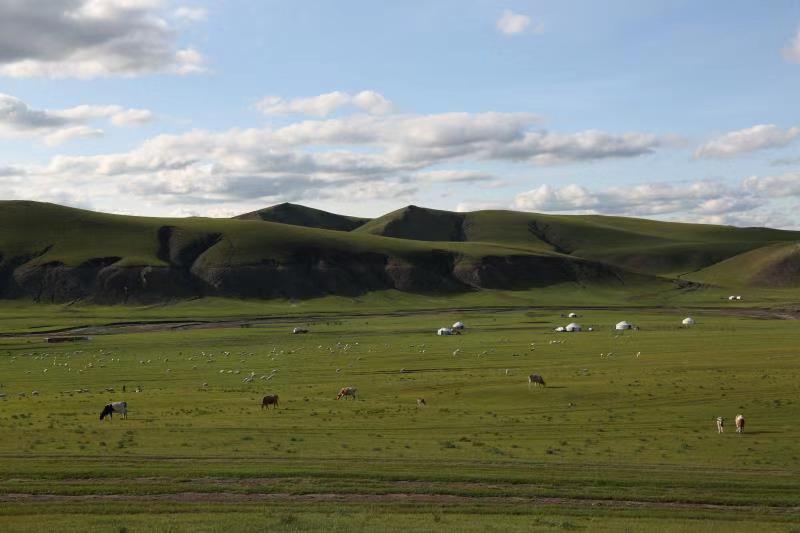Discovering the purity of Inner Mongolia
- By Harvey Dzodin
 0 Comment(s)
0 Comment(s) Print
Print E-mail China.org.cn, September 19, 2019
E-mail China.org.cn, September 19, 2019

I might have gone to Harvard and the London School of Economics, but at the moment I am feeling rather sheepish. Why? Because I've been coming to China for more than three decades and have lived here for half that period, but I only recently made my first visit to Inner Mongolia. What a mistake!
The largely unspoiled natural beauty I found in the vast Hulunbuir grasslands, near China's border with Mongolia and Russia, was astounding. Anyone who visits will invariably want to return again and again for the landscapes, the horses, sheep, cattle and camels, and not least of all the local food and Mongolian culture. And therein is the conundrum of the region: how to promote sustainable economic growth while preserving the area's pristine environment, which must be carefully balanced by the provincial and local governments.
The Inner Mongolia grasslands are largely untouched by modern development and relatively unvisited. Maybe that's a good thing, as too many spectacular places in the world have overdeveloped what nature lovingly crafted over millions of years. But there may be a perfect solution that Chinese like to call win-win and that we call having your cake and eating it too. That solution is ecotourism, and is perfect for this area, where agriculture predominates and many herders struggle to make a decent living.
The term "ecotourism" was coined by Mexican architect Hector Ceballos-Lascurain and adopted by The World Conservation Union, meaning "environmentally responsible travel and visitation to relatively undisturbed natural areas, in order to enjoy, study and appreciate nature (and any accompanying cultural features – both past and present)." This kind of tourism also "promotes conservation, has low negative visitor impact, and provides for beneficially active socio-economic involvement of local populations."
These days, urban youngsters lack appreciation for rural life. Shockingly, it seems like some of them may even think that milk, fruits and vegetables are made in a factory. Most never had the rare opportunity I had when I was an urban-dwelling 7-year-old in Detroit to tend a garden in a greenhouse, to smell the rich earth and plant seeds and watch them flower and grow into delicious fruits and vegetables. Virtually all of us city-slickers never milked a cow or saw the miracle of a lamb being born. It truly benefits the whole family to escape the rigors of city life to an unspoiled place of tranquility.
Years ago I went an ecotourism conference in Changsha. One ambassador spoke about how the government in his country had made a major push for homestay ecotourism. They found that the income from homestay guests was frequently the difference between the farming family making a profit or a loss.
The Inner Mongolian grassland herders I met were all friendly and welcoming — all the makings of perfect hosts. Whether visitors stay in the traditional round Mongolian yurt, a spare room, or a nearby hotel, they can have one of the richest and most unforgettable experiences of their lives. Ecotourism has the realistic potential to positively impact all stakeholders with no losers.
What's more, I was impressed by the government officials I met, from dedicated local officials to Inner Mongolia Autonomous Region Governor Bu Xiaolin. Given the wide open spaces of her province, it's apt to say that she, along with her colleagues, holds up half the sky.
I was also impressed by the devotion of Dr. Ge Jian, chairman of the Grassland Culture Protection and Development Foundation of Inner Mongolia, established in 2006. Dr. Ge has been smitten with the beauty of this heaven-on-earth and has devoted his considerable resources and personal energy to help shepherd the sustainable development of these precious grasslands.
Ge has said: "Culture is the blood and soul of a nation. The unique culture and traditions of different countries and nations are the basis for their survival and continuation. Grassland culture is an important part of Chinese civilization and prairie culture is a valuable resource in the Inner Mongolia Autonomous Region."
The foundation sponsors high-level conferences that go beyond the usual empty talk, with attendees who are really making a difference, from government officials to university presidents and other experts. They actively support the Inner Mongolia-focused work of renowned creative geniuses such as the U.K. author John Man, known for his travel guides, and the Oscar-winning American director-producer Kieth Merrill, the father of IMAX Destination Cinema.
Based on my experience, however, there's no need whatsoever to await the advancement of Inner Mongolia's ecotourism development. Don't be an ignoramus like me, and don't wait; there's more than enough to see and do there right now, in this stunning pastoral paradise.





